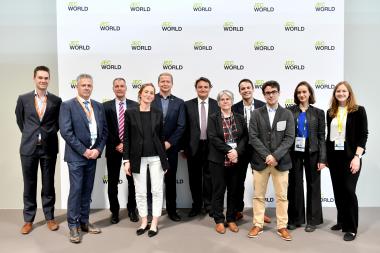Strong partnership for European lightweight technology
Cooperating alliances for lightweight technology: The European Lightweight Association (ELA) and the European Lightweight Clusters Alliance (ELCA) have decided to work together. Both European lightweight clusters are united by the common goal of giving the enormous economic and ecological potential of lightweight technology more visibility in politics, business and science at European, national and regional level. In addition, complementary expertises of work form the basis for the future partnership, from which European lightweight technology can optimally benefit.
"We see great potential in the future cooperation of the ELA and the ELCA to advance lightweight technology in Europe with combined forces," says Dr Katharina Schöps as representative of the ELCA. "In this way, we are strengthening the global competitiveness of European companies and at the same time making a significant contribution to climate protection," says Jean-Pierre Heijster of the ELA about the cooperation of the European lightweight technology networks.
Together, ELCA and ELA represent a growing network of more than 4,500 companies and more than 600 research institutions from 12 European countries active in lightweight technology across different
sectors and industries. This brings together the two largest lightweight technology communities in Europe. Lightweight solutions from Europe can thus gain visibility and be implemented more quickly in global markets.
Joining forces to strengthen lightweight technologies ́ market position at the European level ELCA and ELA want to improve the positioning of lightweight technologies and materials with joint activities and events, in particular to prioritise them on the agenda of the European Commission. The cooperation thus wants to send a clear signal to Brussels. Especially with the view to achieve European climate protection goals; lightweight technology has the potential to conserve valuable resources and reduce CO 2 emissions. At the same time, the improved sustainability with the same or even optimised performance brings valuable competitive advantages for companies. Lightweight products and technologies Made in Europe can thus become a unique selling point for European stakeholders on international markets.
With this cooperation, ELCA and ELA combine their respective strengths: ELCA, as the European Lightweight Clusters Alliance, has very successfully created a resilient pan-European innovation ecosystem for lightweight technology in recent years. ELA, on the other hand, is particularly characterised by its close ties to industrial users. As a result, the existing ecosystem is enriched and a more demand-oriented development and faster market introduction is made possible. In this way, both lightweight technology networks will complement each other optimally in the future in order to bring technology and markets together in a targeted manner.
JEC World European Lightweight Association European Lightweight Clusters Alliance lightweight technology
JEC Group



















